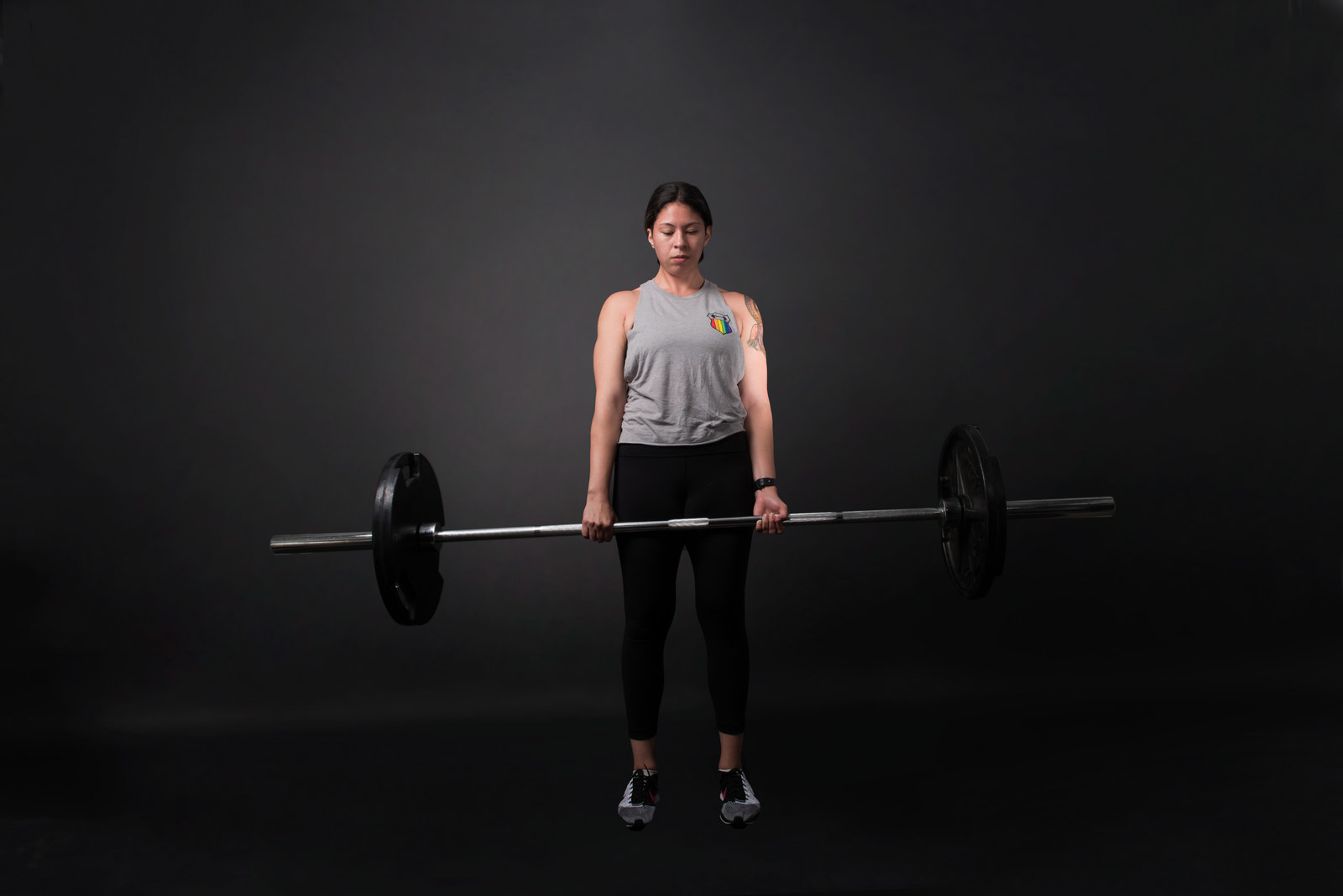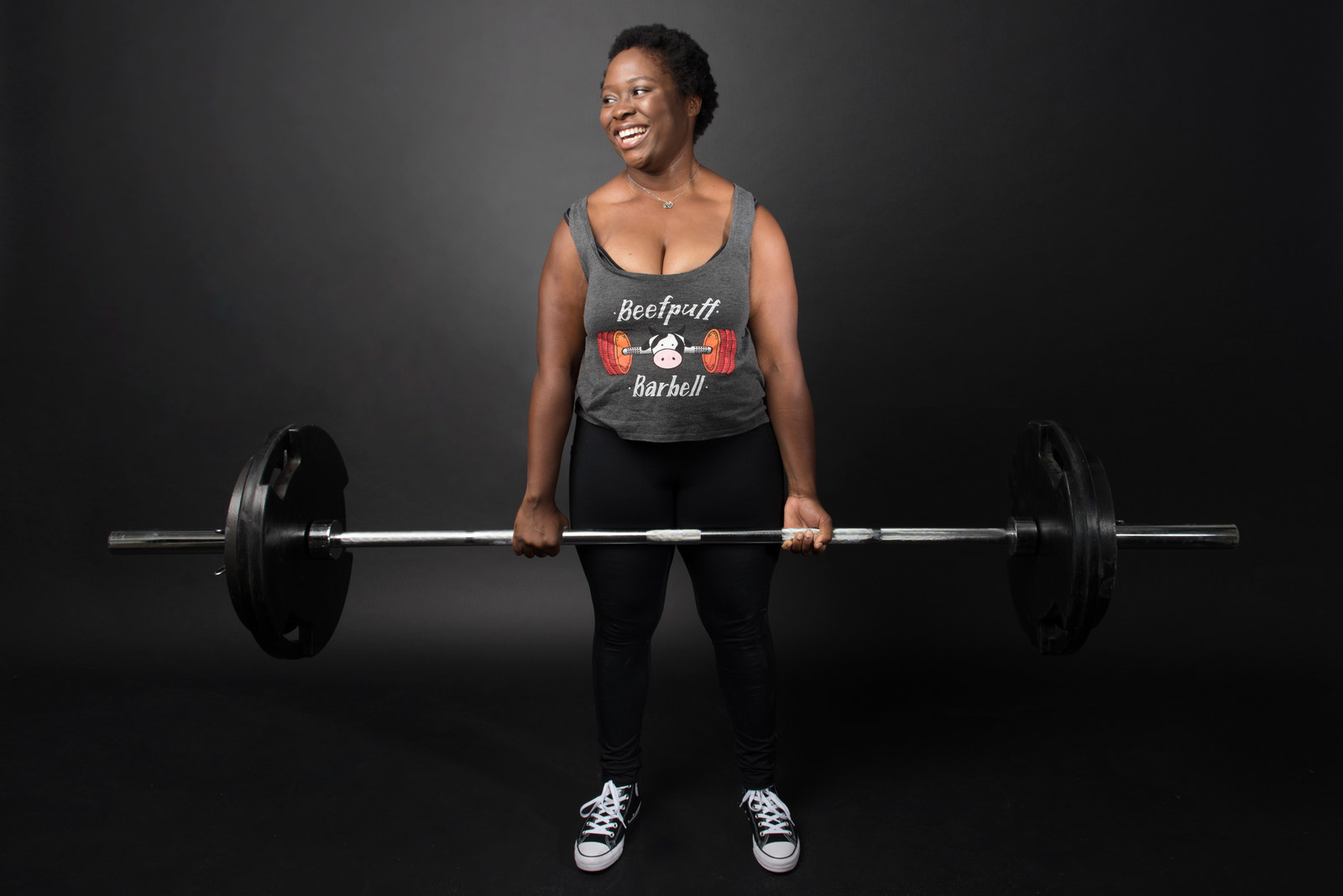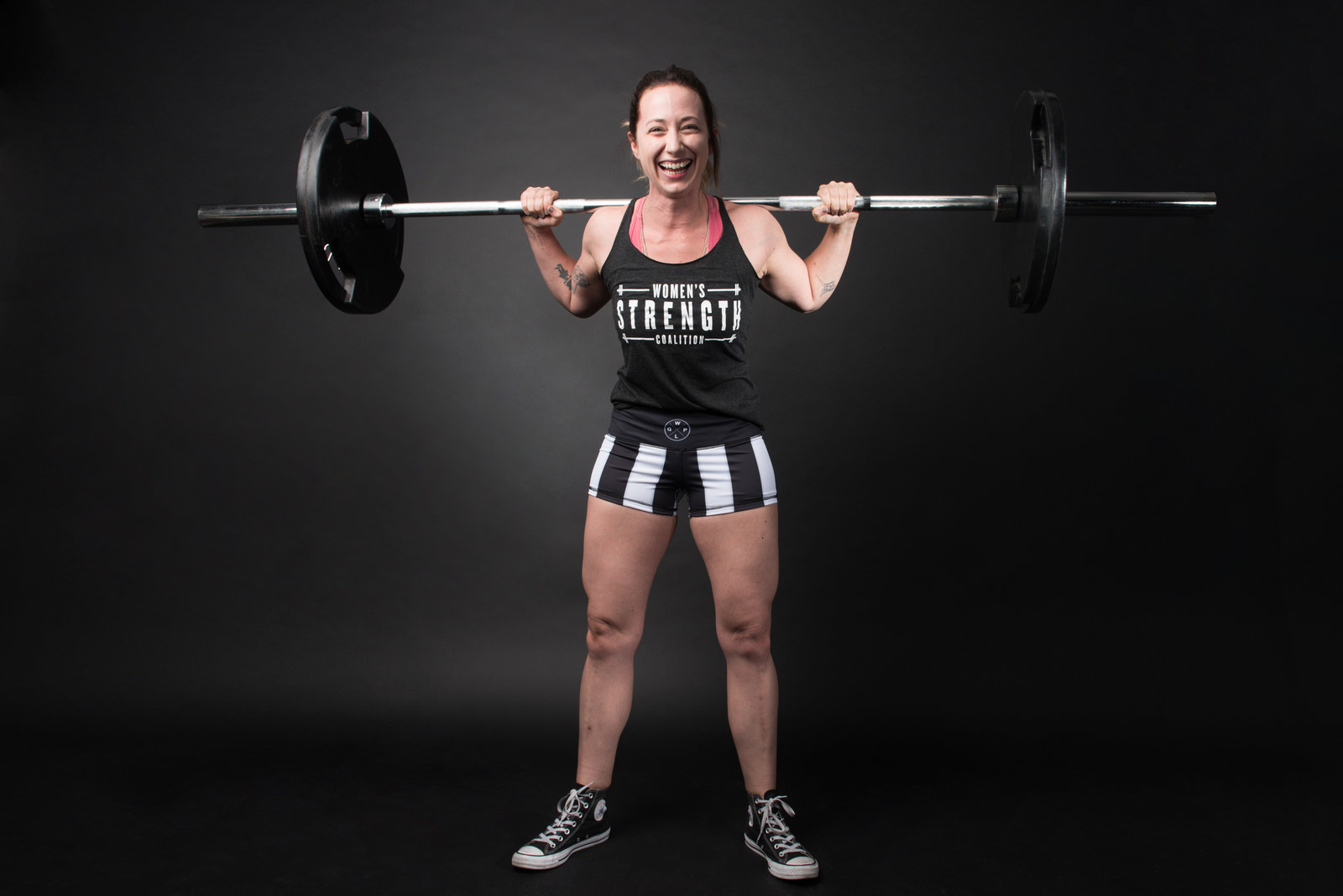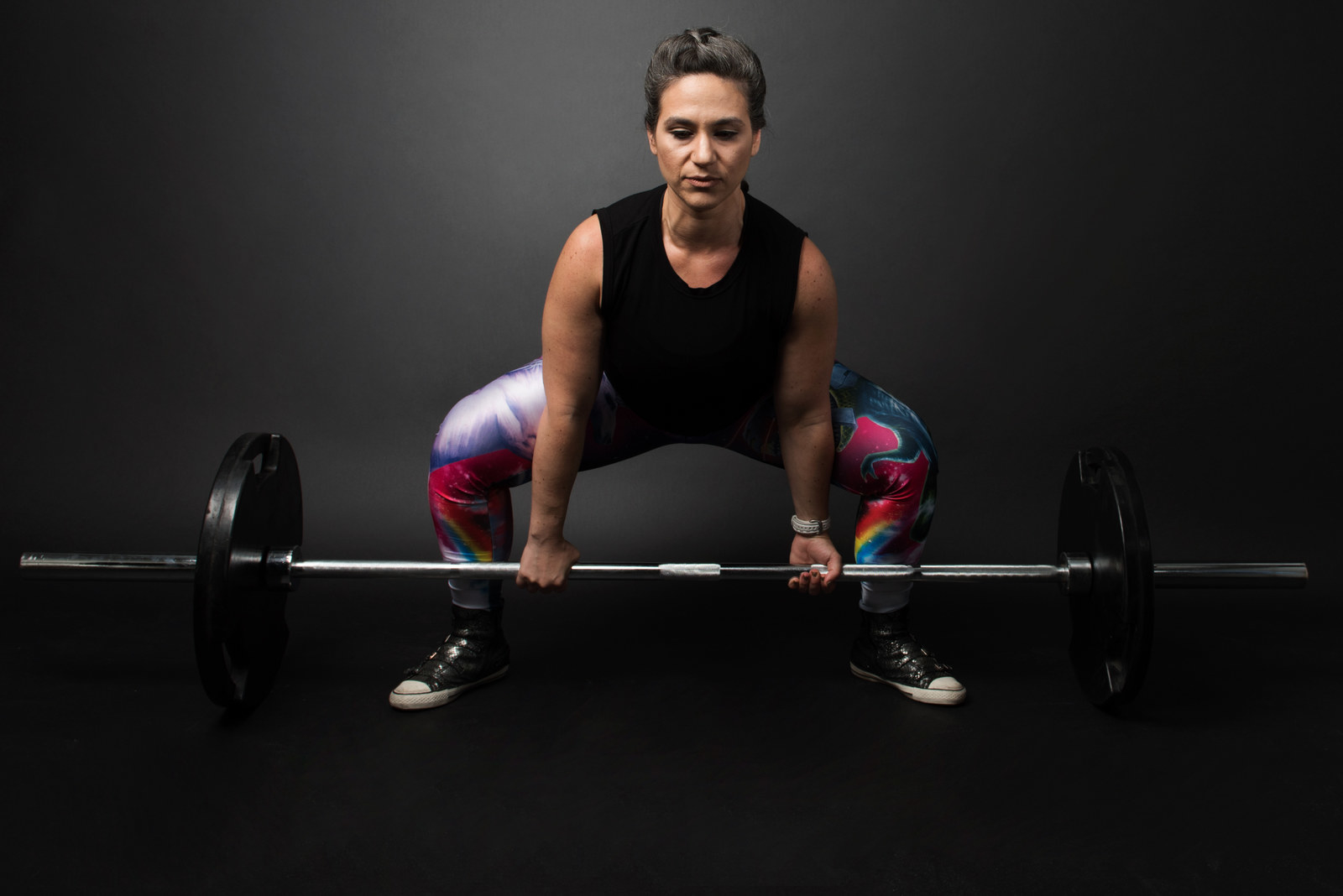Lifting weights can make you physically stronger, sure. But Brooklyn resident Shannon Wagner believes it can also help you to fight oppression, survive challenges and emotional upheaval, and build community.
In early 2017 Wagner founded the Women's Strength Coalition in the belief that being stronger is necessary in resisting oppression, and the theory that strength training can be personally healing and politically transformative for marginalized people and communities. Today, less than a year later, WSC is a small but robust network of 50 lifters with affiliated gyms in eight cities. They're a community of women (cis and trans) and nonbinary people who lift weights not only to get stronger physically, but to build personal and community power. Many of them also compete in the three lifts that make up the sport of powerlifting — bench press, deadlift, and squat.
BuzzFeed Health asked 12 WSC members to tell us how lifting has changed their relationships to themselves and their bodies, and supported and enhanced their passion for social justice.
"All the fears and anxiety I felt towards my mother’s condition disappeared each time I raised and lowered the barbell."

I began powerlifting because I needed strength to fight the greatest battle of my life — losing my ma. It was late February 2017. I was nine months into my fitness journey. My mother was dying. I needed something rough. So, my coach taught me how to deadlift. All the fears and anxiety I felt towards my mother’s condition disappeared each time I raised and lowered the barbell. Each week, I would hit a personal record (PR). Each week, my ma overcame a health challenge. Her doctors stood around her bed, amazed at both of our feats. She would scribble on her notepad, “It’s mind over matter.”
One day I jokingly asked her if I should enter a deadlift competition. She scribbled on her notepad, “Do it! It’s mind over matter.” She winked at me and tried to make a muscle with her left arm while the four IV lines dangled around her wrist.
I lost my ma on Mother’s Day. Her final text message to me was instructions to continue exercising. The day of the competition was two weeks after my mother’s funeral service. I wore her necklace and channeled her mantra: “mind over matter.” I pulled a personal record of 253 pounds on my final attempt.
—LaToneya Burwell, 37, Brooklyn, call center manager and trainer, 84kg powerlifter
Those tangible moments of growth are what make me confident when I approach the platform on competition day, or when I head into a business meeting with a client, or when I'm making a decision at home as a family.
"Come competition day, you are the only one on the platform. No one else is lifting that weight for you."

Barbell sports have illuminated traits and approaches about myself that I love, and even more exciting to me are the ones that I know I have an opportunity to test and fine-tune with people around me that I trust.
Come competition day, you are the only one on the platform. No one else is lifting that weight for you. For me personally, it's the process of getting to the platform that I love the most. I can easily label each training cycle I've had with themes of self-growth. Those tangible moments of growth are what make me confident when I approach the platform on competition day, or when I head into a business meeting with a client, or when I'm making a decision at home as a family.
—Kayleigh Collins, co-owner, OpenTent, and powerlifter, Murder of Crows Barbell Club
The experts who treated me told me that I would never powerlift again, but this only strengthened my resolve to get back to the gym as fast as possible.
"Powerlifting boosted my happiness and confidence, proved my inner strength, and delivered me from my obsession with weight loss."

In late 2012 I found a barbell-training program, and hired a personal trainer to teach me how to safely execute the exercises. In summer 2013, I joined the South Brooklyn Weightlifting Club (SBWC). That December I was hit by a car as I walked in a crosswalk. The experts who treated me told me that I would never powerlift again, but this only strengthened my resolve to get back to the gym as fast as possible.
And it was just about a year later in November 2014 that I decided that it was time for me to start powerlifting again. I joined a gym and tried to squat the empty barbell, but I was too stiff and it was too painful. A coach offered to train me, promising that she could get me under a barbell again. True to her word, I got strong and flexible enough to resume powerlifting. In summer 2015 I continued lifting and competed in my first USA Powerlifting meet in September 2015, less than two years since the accident.
I say God and powerlifting saved me. Not only did powerlifting develop my muscles and protect my bones, but according to one of my neurologists, it helped me heal from the traumatic brain injuries I sustained in the accident. It also boosted my happiness and confidence, proved my inner strength, and delivered me from my obsession with weight loss.
—Stephanie C. Baker, attorney and competitive powerlifter
Being an openly queer woman of color in the powerlifting community is quite the experience. I never step away from my identity as a brown queer woman or my LGBTQ rights and feminist advocacy. That does not turn off the moment I step into the gym.
"Powerlifting helped me reclaim ownership of my body, taught me to take up space, to feel safe in that space, and not to derive self-worth or value from the number on the scale."

Women are taught to take up the least amount of space as possible, whether that be vocally, in both the public and private realm, or physically. Of course, you still see a social media bias in favor of the slim/toned white women and, real talk, body shaming is ridiculously prevalent in the powerlifting community. Even so, there is a large part of the female-identified powerlifting community that fights to take up all that space we were taught to feel embarrassed about and reject. I think that is powerful to witness and be a part of. Powerlifting helped me reclaim ownership of my body, taught me to take up space, to feel safe in that space, and not to derive self-worth or value from the number on the scale.
Being an openly queer woman of color in the powerlifting community is quite the experience. I never step away from my identity as a brown queer woman or my LGBTQ rights and feminist advocacy. That does not turn off the moment I step into the gym.
Breanna Diaz, 29, Washington, DC, legislative counsel at Human Rights Campaign
The opinions expressed here are Diaz's own and do not reflect those of her employer.
Building physical strength is an extension of what happens inside.
"Training with barbells makes me feel like a badass who broke from expectations."

Strength training and having muscles makes me feel spiritually and emotionally stronger. Contrary to the media fitness hype, I don’t work out with the goal to get smaller and smaller. I choose to create strength and I embrace the evidence of it!
As an Asian woman, the Old World cultural goal is to be petite, quiet, and ladylike. Training with barbells makes me feel like a badass who broke from expectations.
Building physical strength is an extension of what happens inside.
—Tina Tang, 46, jewelry designer and personal trainer
We have taken this concept even further by building a community of empowered, body-positive, and strong individuals through our company Beefpuff Barbell.
"Focusing on strength and growth with this body-positive crew was a healthy space to work on my eating disorder and body image issues."

Before I found powerlifting, I had been a gymnast for 15 years. I was frequently picked on for being larger than my teammates. I developed mental toughness on the exterior, but I was emotionally broken. I had also developed an eating disorder.
Finding the powerlifting club in college was my saving grace. It was a vastly different environment where you go to the gym and put some weight on the bar. Negative body talk is minimal. Food is valued as fuel. Focusing on strength and growth with this body-positive crew was a healthy space to work on my eating disorder and body image issues.
Back in 2015, in response to social media trends, two powerlifters and I started referring to ourselves as "beefpuffs.” It was our way of reclaiming the bodies of women in powerlifting. The concept caught on. People liked how we came up with a way to revere our not-so-lean-but-really-fucking-strong bodies that we grew to love and appreciate.
We have taken this concept even further by building a community of empowered, body-positive, and strong individuals through our company Beefpuff Barbell.
—Chelsea Savit, cofounder and coach, Beefpuff Barbell, international elite powerlifter
Getting used to the gym environment was not always fun. Guys would take a squat rack I was using. They would even take weights off of my bar when I would go to get a drink from the water fountain. It was like I was invisible.
"Lifting has given me an outlet for my frustration, a way to tame my anxiety and a break from the stresses of medical school and motherhood."

I got into powerlifting in 2012, after my partner finally convinced me to go lift with him. He had been trying to get me to lift since we started dating in 2009, but I told him I didn't want to get bulky. When I first started, I actually hated it. I could barely squat the bar, and I definitely couldn't bench it. I was embarrassed by how weak I was and thought I looked stupid. For some reason, I kept going to the gym with him.
Getting used to the gym environment was not always fun. Guys would take a squat rack I was using. They would even take weights off of my bar when I would go to get a drink from the water fountain. It was like I was invisible. I have my suspicions about why this was. I don't think it was only because I'm a woman. There were times when I would go to the gym and there would be another girl lifting, but the guys would acknowledge her. One time, a girl asked another guy if any other girls lift, and he said, "No, I never see any girls here," right in front of me (and I was a regular). I suspect being a black woman with natural hair, a baggy T-shirt, and no makeup meant I didn't exist.
As time went on, I discovered different blogs and fitness groups to follow. Even some of the ones that promoted a lean aesthetic started shifting to a more body-positive message. Lifting has given me an outlet for my frustration, a way to tame my anxiety and a break from the stresses of medical school and motherhood.
—Mary Nwosuocha, 30, New York City, budding physician, mom, and powerlifter
Our mission is to build stronger communities through increased access to strength training.
"Strength training allows individuals to foster literal and figurative strength. What started as a female-focused organization is evolving into something more."

Powerlifting has shifted the way I interact with my environment and has fundamentally changed the way I experience my physical body. When I first began lifting, it was in an effort to win the approval of others by improving my appearance. As I became stronger, my mindset shifted, and I fell in love with the way it made me feel. Lifting helped me build confidence, so that I don’t need to look externally for validation.
Strength training allows individuals to foster literal and figurative strength. I started Women’s Strength Coalition as a female-focused organization but it is evolving into something more. Our mission is to build stronger communities through increased access to strength training. Our next phase of work is to open the People’s Strength Coalition, our first nonprofit gym space and community center in New York City, accessible to cis and transgender women, as well as LGBTQ individuals.
We want to create new tools for social change to promote different avenues of action and personal development, and to empower communities to advocate for local issues.
—Shannon Wagner, founder, Women’s Strength Coalition
Regardless of how I present now, I continually feel strong, lovable, and comfortable taking up the space my body and feelings need at a given time.
"With each training day, I became less inclined to hide in life."

I took up strength sports in 2013. I was 35 and until that moment, I identified as a nonathlete. Growing up, I hated sports. I was last picked in gym class, but the first teased. I was nerdy, overweight, and seemingly unathletic. I equated sports with humiliation.
I stayed committed to the narrative of being a totally unathletic person until I began to work out with my trainer and coach, Ed. I started going to the gym out of medical necessity, but Ed saw the athlete in me. Six years later, I found the confidence I needed. I pointed to some weightlifters and said, “I want to do that.” My training immediately shifted to learning how to really move load.
With each training day, I became less inclined to hide in life. Since 2013 my body has changed shape and size countless times. Regardless of how I present now, I continually feel strong, lovable, and comfortable taking up the space my body and feelings need at a given time.
—Laura Khoudari, 39, New York City, trauma-informed strength trainer and strength coach and mom
The day I planned on going through with my suicide, I deadlifted 185 pounds.
"Powerlifting saved my life."

A few years back, I was suicidal. I felt alone, and I didn't know what else to do. I was going to the gym regularly at the time. The day I planned on going through with my suicide, I deadlifted 185 pounds. I had never lifted that much weight in my life! It was exhilarating and empowering, and I realized I didn't want to end my life because I wanted to see how strong I could become.
Powerlifting saved my life. And I know there are other women out there who feel the same way. When I first heard about Women’s Strength Coalition, I knew it was something I wanted to get involved in. I wanted others to fall in love with powerlifting the way I did, and gain both mental and physical strength from it too. I wanted to be a part of something that fosters self-esteem for people of all ages and creates a community where people can feel both strong and empowered with who they are without having to feel the need to change themselves to fit a stereotype. That's exactly what the Women's Strength Coalition has to offer, and I love that.
—Araliya Ming Senerat, 25, Queens, MPH candidate
When you approach the bar knowing that you are preparing to lift some really heavy weight, you have to approach it with confidence, resolve, and determination.
"I’m want to encourage women to take up more space in the world and show up unapologetically and authentically."

Powerlifting was a game changer for me. It paved the way for me to focus less on being a smaller version of myself and instead focus on gaining and developing more strength. I’m now unapologetic about my body.
When you approach the bar knowing that you are preparing to lift some really heavy weight, you have to approach it with confidence, resolve, and determination. These are the same skills you need to face everyday life. Getting stronger and tougher in the gym made me more mentally prepared to handle challenges outside of the gym.
As a strength and nutrition coach, I strive to help women reach their goals, whether they be strength goals or physique and fat loss goals, but I also hope that I can help them do more than just that. I’m using my small platform to talk about the lack of diversity and representation of women of color in the fitness industry and why it’s so problematic. I want to encourage women to take up more space in the world and show up unapologetically and authentically.
—Chrissy King, 32, Milwaukee, strength and nutrition coach, powerlifter, and writer
The stronger and healthier we are, the more connected we are, the more empowered with resilience, patience, and awareness we are, the more compassionately and energetically we can collaborate for healing and justice.
"Liberation for all means feeling safe and free in our own bodies."

Lifting weights doesn't do anything to dismantle white supremacy and heteronormativity or mitigate greed and exploitation, but strength and freedom in the body are universal human rights, just like water and food and connecting with nature. Strength comes in many forms, and how many pounds we move has little to do with it. The Women's Strength Coalition motto is "strength for all" and that intention does not stop in the gym. Liberation for all means feeling safe and free in our own bodies. Now and always are vital times to make that safety real and lasting for anyone who’s black, indigenous, a person of color, disabled, queer and LGBT, gender nonconforming, immigrants, refugees, poor, marginalized, and all of us who live at the intersections of these identities and experiences.
What does lifting or any athletic training have to do with this? The stronger and healthier we are, the more connected we are, the more empowered with resilience, patience, and awareness we are, the more compassionately and energetically we can collaborate for healing and justice.
—Davi Cohen, 38, Brooklyn, farmer, mentor, and embodied explorer
Women's Strength Coalition's next goal is to open their first nonprofit space in New York City — People’s Strength Coalition — for cis and transgender women, and LGBTQ individuals. You can learn more and donate here.

